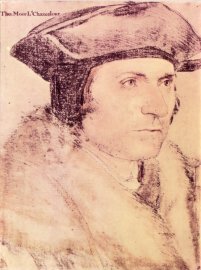|
More was a married man, father, writer, lawyer, Lord Chancellor of England, and martyr. He was known for his intellectual brilliance, wit, and integrity undergirded by a deep personal piety. More was "born and made for friendship» according to his contemporary, Erasmus-his character was like his face, Erasmus said, cheerful and ready to smile.
More was from London, England, the son of a lawyer. He studied at Oxford, prepared for the law at Lincoln's Inn, and was admitted to the bar in 1501. He lectured, in law and, in 1504, entered Parliament. Drawn to the monastic life, he lived near the Carthusians, participated in their spiritual exercises, wore a hair shirt (a lifelong practice), and followed an ascetic, penitential life.
Ultimately, he decided to pursue a secular carter, and in 1505, he and Jane Colt married and had three daughters and a son. Their home became a center of culture, attracting the leading intellectual figures of the day. When Henry VIII took the throne in 1509, he launched More on a brilliant career of public service beginning with an appointment as undersheriff of London.
At almost the same time, More's wife died, and within the month he married Alice Middleton, a widow seven years his senior and a good pragmatic choice as a stepmother to his young children. His family was of great concern to More, and he not only formed his children in the faith but also provided each of his daughters with an excellent education, an uncommon practice at the time. His home life was lively and cultured, and when More traveled he regretted his time away from his children, writing to them nearly every day.
More finished his famous book, Utopia, in 1516, went on several diplomatic missions for the king, was knighted in 1521, and filled a series of high offices until, in 1529, Henry appointed him Lord Chancellor.
At the time, King Henry was agitating to have his marriage to Catherine of Aragon declared invalid, which would free him to marry Ann Boleyn. More defended the validity of the first marriage, to the great anger of the king, and in 1532 resigned as Chancellor, thereby losing his income and plunging his family into poverty.
He refused to attend the coronation of Anne Boleyn and lived quietly for a year and a half until summoned to swear to the Act of Succession, which involved, in part, the repudiation of papal religious authority. He refused, was accused of treason, and was imprisoned in the Tower of London for fifteen months.
He spent the time in prayer and penance, wrote devotional books, and resisted the entreaties of his Family (led by his beloved daughter, Margaret) toconform. He was beheaded on july 6, 1535, declaring to the crowd: "I die the king's good servant, but God's first."
Feast: June 22.
Cynthia
Cavnar
|


